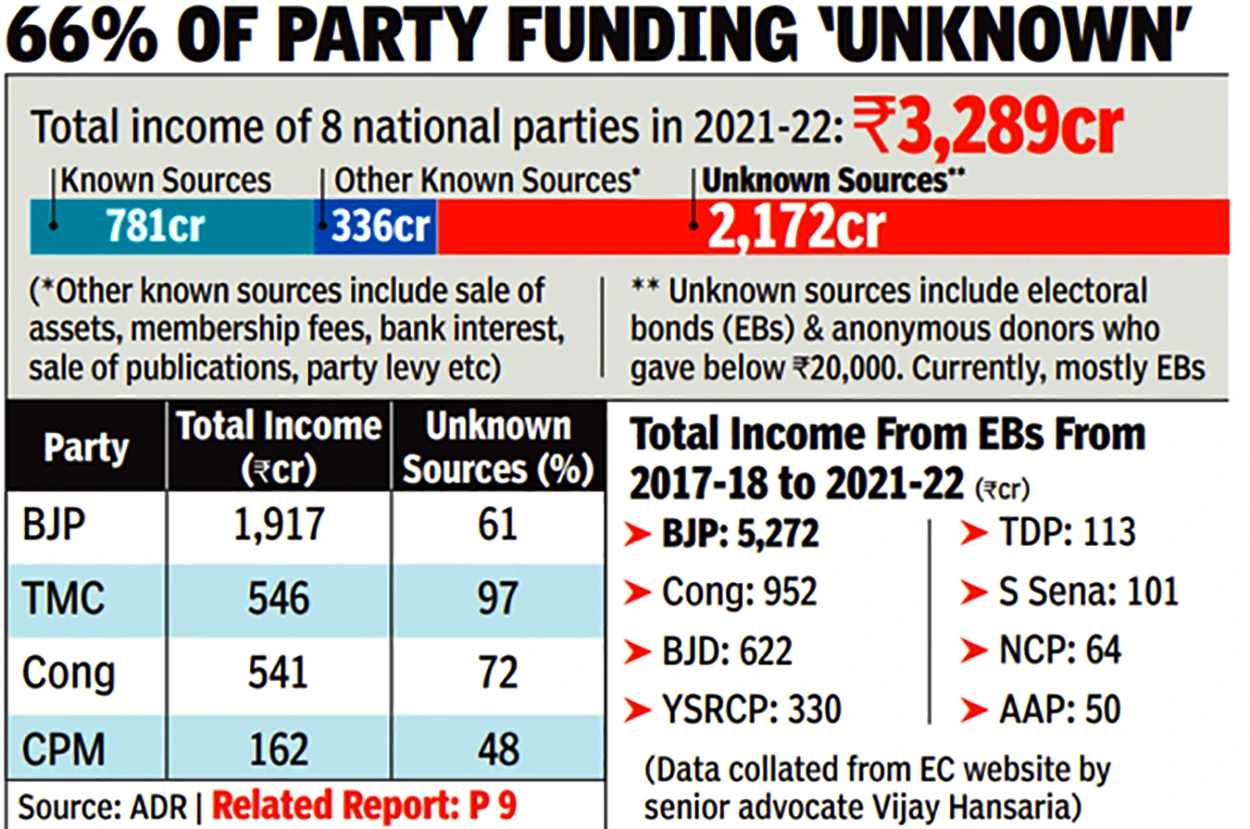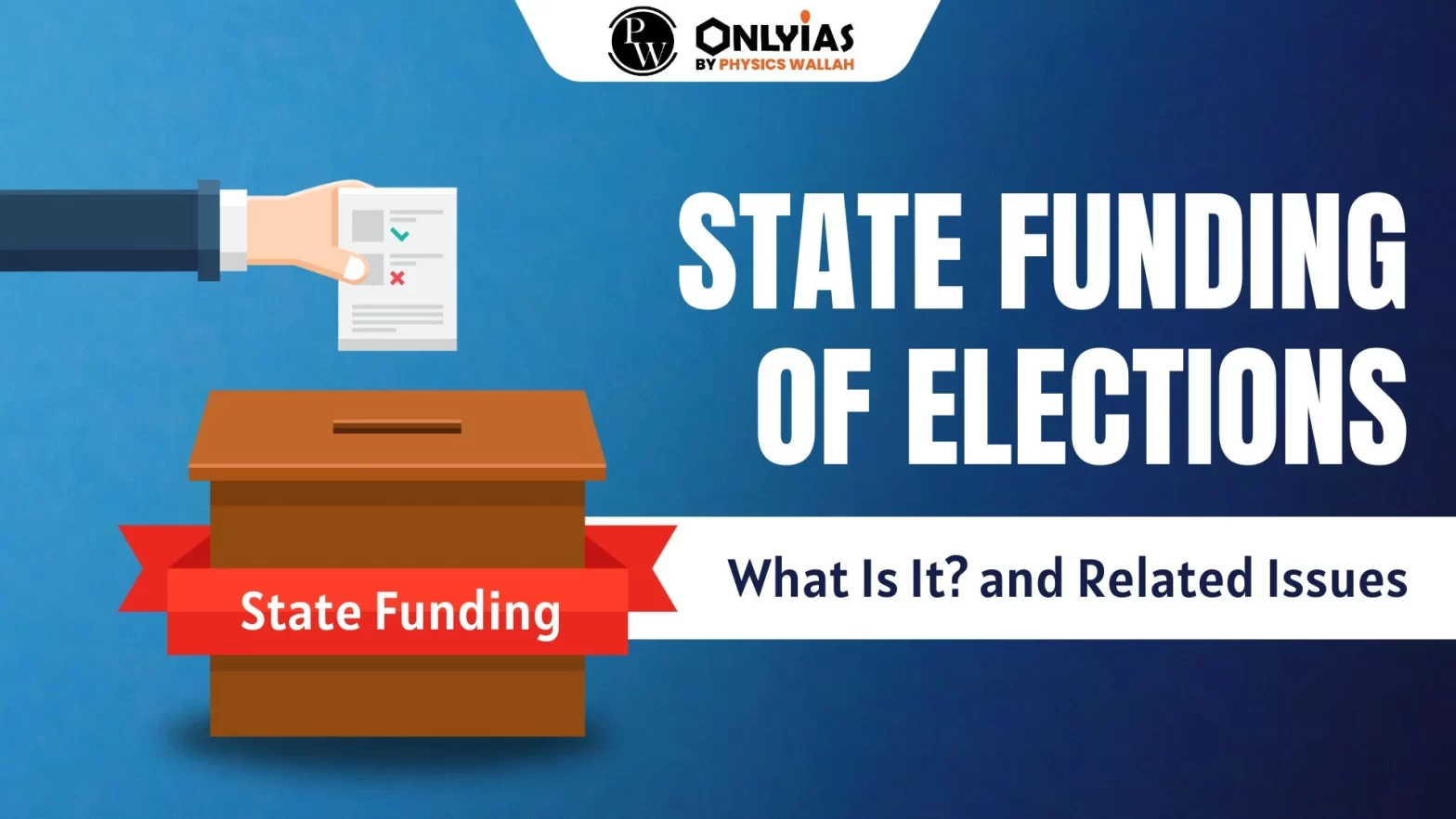Context:
- This article is based on an Editorial “Should elections be state funded?” which was published in the Hindu. Recently, a Constitution Bench headed by the Chief Justice of India reserved its judgment on petitions challenging the validity of the electoral bonds scheme.
| Relevancy for Prelims: State Funding of Elections and associated Committees.
Relevancy for Mains: Political Funding, State Funding of Elections and its associated issues. |
What is state funding of elections?
- From Public Exchequer: In state funding of elections, parties, and candidates receive funds from the public exchequer/state budget rather than having to raise money entirely on their own.
- Significance: This can promote transparency if proper oversight mechanisms are in place on how these funds are utilized.
- Mode of Funding: The quantum and mode of funding can vary across countries. It may be in the form of direct cash transfers, subsidies on campaign expenses, or indirect state funding.
- Example: Japan reimburses 50% of expenditure on public meetings and advertising for candidates. South Korea provides subsidies for online promotion and voter data analysis.
What is the need for State Funding of Elections?
- Lack of Transparency in Political Funding: There are no limits on campaign spending or mandatory disclosures of sources of funds for parties and candidates.
- Potential for Corruption: Private funding can lead to the influence of wealthy individuals, businesses, or interest groups on political decisions.
- Policy Capture: Donors and corporations may influence the policies of the parties they fund. This can lead to cronyism and policy capture.
- Unequal Playing Field: Those with access to greater financial resources have a competitive advantage, which can hinder the participation of others (having lesser financial resources).

- Black Money and Illicit Funding: It can compromise the integrity of the electoral process and erode public trust in the political system.
- Frivolous Spending: In the absence of spending limits, parties indulge in an arms race of expenses on rallies, advertising, etc., which may be wasteful.
- Voter Manipulation: Unchecked spending on voter gifts, cash for votes, etc., manipulates electoral outcomes through money power.
- Plutocracy: The current system favors the wealthy and those backed by powerful business interests rather than just popular support.
- A plutocracy or plutarchy is a society that is ruled or controlled by people of great wealth or income.
- Criminal Nexus: Unaccounted funding facilitates the nexus between criminals, wealthy businessmen, and politicians.
Associated Committees formed for state funding of elections and their recommendations
- Indrajit Gupta Committee on State Funding of Elections (1998): Recommended partial state funding in the form of limited indirect subsidies for candidates and recognized parties.
- Law Commission Report on Electoral Reforms (1999): Advocated partial state reimbursement of election expenses to recognized parties and candidates to reduce corruption.
- Second Administrative Reforms Commission Report (2008): Endorsed state funding of elections as part of a package of reforms to tackle corruption and criminalization in politics.
- National Commission to Review the Working of the Constitution (2001): Recommended state funding of elections as an anti-corruption measure if certain transparency conditions are met.
What issues are associated with the state funding of elections?
- The burden on Taxpayers: Using public funds for political campaigns places an additional burden.
- Potential Misuse of Public Funds: Without proper oversight and accountability mechanisms, there’s a risk that public money could be wasted or used for unintended purposes.
- Unfair to Non-Political Causes: State funding may divert resources from other essential public services like education, health, and infrastructure that require attention and funding.
- No Guarantee of Fairness: Allocation criteria and distribution mechanisms can be manipulated or biased, potentially favoring certain political parties or candidates.
- Free Speech Concerns: Restrictions on private funding may limit the ability of individuals and organizations and violate their right to express political preferences.
- Government Influence: Parties may become overly dependent on the government for funding, compromising their independence and ability to act as a check on the government.
- One-size-fits-all approach: Different regions, parties, and candidates may have varying needs, and a one-size-fits-all approach may not address these differences effectively.
- Encourages Complacency: State funding may lead to political parties becoming complacent, as they no longer need to actively engage with voters and supporters to secure private donations.
Conclusion:
State funding of elections involves political parties and candidates receiving funds from the public exchequer or state budget instead of relying solely on private donations. This practice aims to address issues like lack of transparency, potential corruption, unequal playing fields, and the influence of black money in political funding. All stakeholders are required to come up at a table to discuss and deliberate their concerns and find a suitable solution that would be accepted by all within the Constitutional values.
![]() 17 Nov 2023
17 Nov 2023


